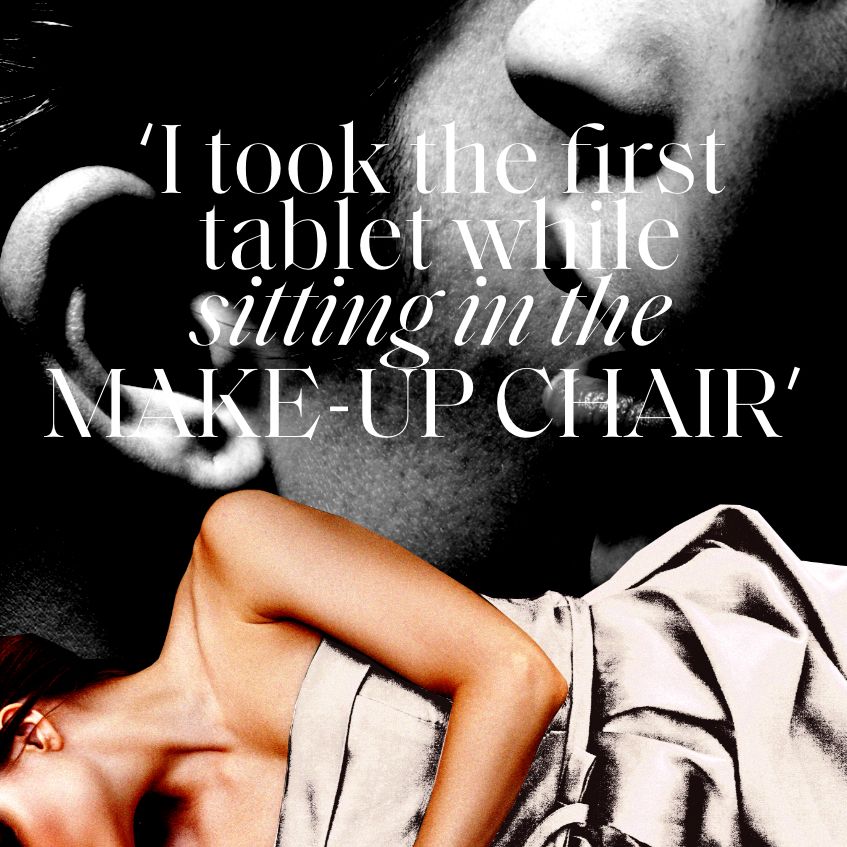I’d never taken drugs before a wedding. I’ve been a bridesmaid several times since childhood, so I’m used to having a congregation’s eyes on me. But this time was different. My friend Claire* asked me to be bridesmaid a year before her wedding in 2018. As an event planner, I knew from the beginning that she’d create a dream day just as chic as she is. Her in-laws’ home was chosen as the location for the reception. Their acres of land, populated with adorably quaint cottages, were the perfect spot for a marquee. Other than briefing me and the other bridesmaids with a colour scheme for our dresses, all Claire wanted us to do was show up and enjoy her big day. A few months before the wedding, however, Claire asked me whether I’d like to read a passage from Dolly Alderton’s book, Everything I Know Above Love, at the church service. I was thrilled.
I’ve always described myself as a confident person. I regularly sang and acted in school plays as a teen, so the thought of standing at a pulpit and speaking to a crowd didn’t worry me. Above anything, I was flattered the couple had chosen me for such an important role. But, in the lead up to the wedding, for the first time in my life I began to understand what it meant to get the jitters. It soon dawned on me that unlike a school performance, the reading would involve me addressing a crowd of 120 anticipating people on one of the most important days of my friend’s life.
I thought of all the weddings that had gone before, when those unaccustomed to public speaking had sounded painfully monotone and uninterested when delivering a speech. As a result, I decided to learn the words to the passage off-by-heart, like an actor committing their lines to memory. But, as the day edged closer, my niggling nerves wouldn’t subside. Weeks before the wedding I messaged a friend and told her how nervous I was feeling. ‘Have you ever taken beta blockers*,’ she asked me. At the time, I’d never heard of them. According to the NHS, beta blockers work to slow down the heart by blocking the action of hormones, like adrenaline. My friend revealed she often took them to ease her anxiety. According to her, the tablets would stop all the physical reactions of my nerves on the wedding day, so while I may feel like fainting, my nerves wouldn’t manifest outwardly in the form of shaky hands or a racing heart. This is exactly what I need, I thought to myself. Days later she sent me a card in the post containing two beta blockers and a note with my instructions: take one tablet on the morning of the wedding with breakfast and another 15 minutes before entering the church.
On the morning of the big day, I took the first tablet while sitting in the make-up chair. It turns out I wasn’t the only one popping pills - the bride told me she’d also taken a beta blocker that morning as she was anxious about walking down the aisle. When we arrived at the church, the bridesmaids lined up outside waiting to go in. I remember how at ease I felt, and decided to take my second tablet with a glug of water. Minutes later, I was standing at the pulpit, giving the performance of my life. The vicar, who had been working in the Church for over 35 years, even came up to me at the end of the service and said it was the best reading she’d ever heard.
At the reception I was sat on the top table next to one of the groom’s friends. To say he was the life and soul of the party is an understatement. As he reeled off stories about wild nights out and holidays around Europe, I knew we were going to have a good time. I’d had a few glasses of champagne at this point with very little to eat during the day, but we both soon found ourselves downing limoncello shots before the speeches had even begun. From then on, things start to get a bit blurry.
Fast forward an indefinite amount of time; I woke up to find myself lying horizontal on a sofa in one of the cottage’s annexes. It was pitch black, but I could faintly hear music and cheering from the reception in the distance. I felt refreshed, as if I’d been in a deep slumber. Confused as to why I’d been asleep or how I’d arrived at the cottage, I started to move. A loud crackling noise pierced the silence. Covering my body was a giant makeshift tin foil blanket. I grabbed the nearest pair of shoes I could find and left the cottage to find out what was going on.
Using the marquee’s lights in the distance as a homing beacon, I trudged across a field and inside the marquee to rapturous cheers. ‘I’ve only been gone for a few minutes,’ I laughed to my friends as they huddled around me. ‘What are you talking about?’ they chimed in unison. ‘You’ve been asleep for five hours. You’ve missed the entire reception. The bride and groom have already left!’ I stood there in disbelief. I later learned (with the help of an embarrassing wedding video, no less), that the cocktail of alcohol and beta blockers on an empty stomach had resulted in me passing out during the reception – bare foot – and my friends having to carry me to bed. They found a roll of tin foil in the kitchen and wrapped me up in sheets of it to keep me warm. I was mortified.
The next day the bride and groom hosted a big lunch for guests and, unsurprisingly, I was the talk of the party. As I attempted to hide my embarrassment with laughter, I soon learned that a rumour was spreading among the guests about me taking Valium recreationally all day. Worse still, the news had made its way to the bride and groom. ‘Why were you taking Valium on my wedding day?’ Claire furiously muttered to me under her breath when I approached her at the lunch. Taking out the packet of beta blockers from my handbag, I quickly explained what had happened and apologised profusely for my behaviour.
While most people found my antics on the day hilarious, I’m still so upset I missed so much of my friend’s wedding. I’d been excited for months for the couple’s big day, but other than a few hazy images I can barely remember a thing from it.
If you've got a story that you think would work for Wedding Confessionals, please email [email protected].
*The NHS states that beta blockers are prescription-only medicines, which means they can only be prescribed by a GP or another suitably qualified healthcare professional. Beta blockers are not suitable for everyone. Find out more information here.














